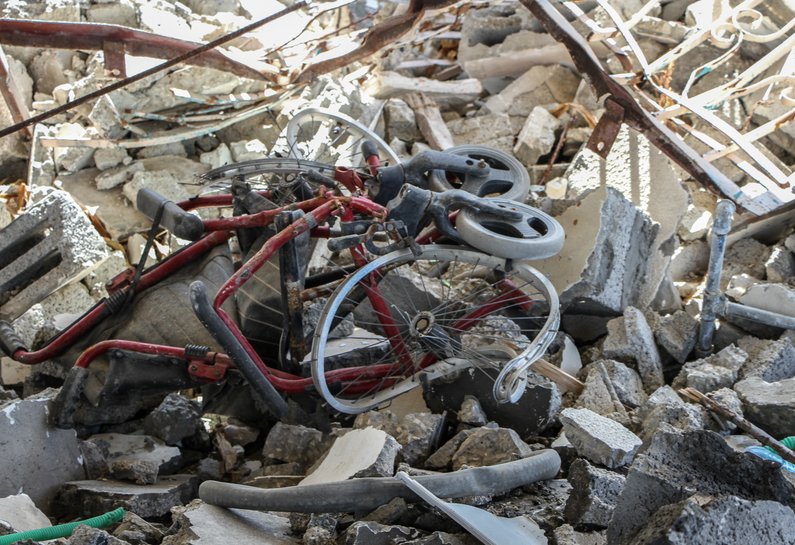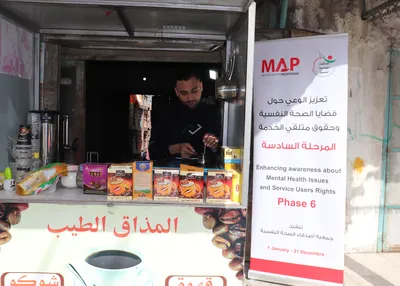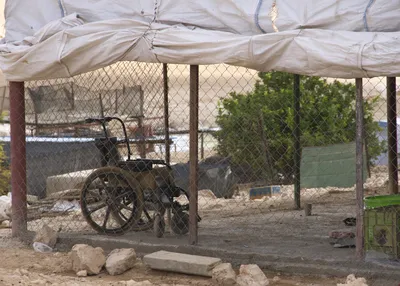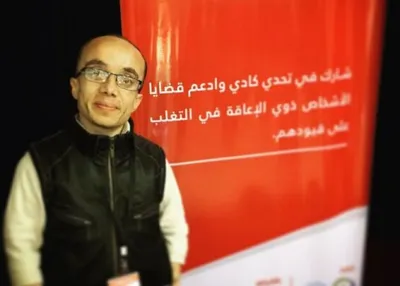Voices from Gaza: Living with a disability under blockade

Last month, Medical Aid for Palestinian’s (MAP) team in Gaza met Palestinians with disabilities who participate in our ‘Inclusive and Accessible Society’ project to discuss the barriers they face in attaining full and equal participation in society.
Israeli military offensives on Gaza
The group first talked about the harm caused by Israel’s military offensives to people with disabilities in Gaza.
They highlighted the increase in the number of Palestinians with a disability as a result of Israeli military offensives on Gaza, with a quarter of the group disabled directly or indirectly by the actions of the Israeli military, including shelling of civilian areas. During Israel’s 2014 offensive more than 2,000 Palestinians were killed and 11,000 injured, 10 per cent of whom received permanent disabilities.
The group also talked about the consequences of Israel’s failure to protect health facilities and personnel and other civilians and civilian infrastructure during its military offensive, including their responsibility to take all necessary measures to ensure the protection and safety of persons with disabilities in situations of risk.
On 12 July 2014, the Israeli military attacked the Mebarret Al Rahma Centre for People with Disabilities, killing two disabled women and severely injuring three disabled residents and a support worker. One of the women killed, Suha Abu Saada, had previously lost a leg when as a child her room had been hit by Israeli shelling in a previous round of activities. Her story illustrates the legacy of a lifetime of the repeated attacks on Gaza.
Everyone evacuated except for me as I didn’t hear the sound of the bombing. I was terrified
The group emphasised that during the 2014 offensive, Palestinians with disabilities - including those with mobility restrictions, hearing and visual impairments - had severe difficulty evacuating civilian buildings which came under attack, increasing their risk of injury and death. When preliminary warnings were given by Israel, these were often not effective or broadcast long enough in advance of an attack for some individuals with disabilities to evacuate safely.
One individual with a hearing impairment said: “During the last military offensive on Gaza my neighbour’s house was targeted and everyone evacuated except for me as I didn’t hear the sound of the bombing. I was terrified.”
In some circumstances people with disabilities had to be left in their homes, as family members were unable to evacuate them. This was the case for an 18-year-old woman with a physical disability who had participated in MAP’s disability project in Gaza and was friends with many in the group. She died alone in her family house on 13 August 2014, after her father was unable to evacuate her during an Israeli military attack.
Unemployment
The group discussed the importance of employment in realising their socio-economic rights and how occupation, blockade and closure is detrimentally impacting the employment opportunities of Palestinians with disabilities.
The group highlighted that the extremely high unemployment rate – around 43% -makes it more challenging for people with disabilities in Gaza to gain and maintain employment opportunities.
In December 2016, the Palestinian Non-Governmental Organizations Network stated that 90% of people with disabilities in in Gaza were unemployed.
Restricted access to community and services
The group also discussed how Israel’s occupation and its blockade and closure of Gaza obstructs the rights of Palestinians with disabilities to effective and full participation in public life in the oPt. Many expressed that restrictions on freedom of movement increase the barriers people with disabilities face when trying to access their communities and the services they need.
The group highlighted that Gaza’s only rehabilitation hospital, Al-Wafa, was destroyed on 23 July 2014, during Israel’s military offensive on Gaza. This has severely restricted access to rehabilitation care, increasing the need for Palestinians with physical disabilities to access rehabilitative services elsewhere in the oPt. It was emphasised, however, that obtaining an Israeli permits to travel outside of Gaza for treatment is an extremely difficult process as Israeli security services frequently deny travel permits without explanation, citing ‘security reasons’.
One individual told MAP: “I was working in an access restricted area. The Israeli military shelled us and I lost my sight. I have been unable to travel outside of Gaza for further treatment due to the blockade.”
Shortages in Gaza
Last week the Ministry of Health (MoH) in Gaza announced that 36% of essential medicines and 32% of medical disposables are at ‘zero stock’, meaning that less than a month’s supply is available on shelves. The group highlighted the dire consequences of frequent medical shortages on some individuals with disabilities.
Ongoing electricity shortages in Gaza have particularly affected those who rely upon electrical assistive devices.
Demand health and dignity for Palestinians
The message from the group is clear: That many of the barriers to attaining full and equal participation in society for people with disabilities in Gaza are higher as a consequence of living under Israeli occupation – and that many of the disabilities themselves are a consequence of Israeli military action.
Please join MAP in calling on the UK government to take action to end Israel’s occupation of the Palestinian territories and the blockade and closure of Gaza.
We will deliver a joint call between Palestinian and British people to the UK Government later this year, demanding an end to the occupation and the blockade of Gaza.
To join our call for health and dignity, sign up here.
"I demand health and dignity for Palestinians.The UK government must do more to bring an end to the occupation of Palestinian territory."
Error: Petition page has not been set up or is not currently published
10,434 have signed. Help us reach 11,000.
Related content


